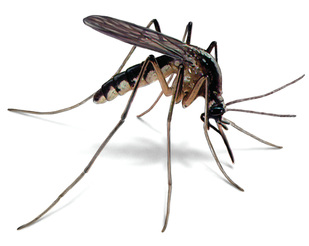- Published on
Enemy Number One: the Mosquito

Mosquitos were an unrecognized but deadly enemy in the Revolutionary War, and no troops suffered more from them than the 8th Virginia. The current plague of mosquitos in South Carolina is a reminder of what Colonel Peter Muhlenberg and his men had do deal with in the summer and fall of 1776.
After record October rainfalls, South Carolina is presently experiencing record numbers of mosquitos, and citizens are calling for state or even federal action to combat the bugs. Tony Melton of Florence, S.C., told a reporter this week that mosquitos were “eating me alive” the last time he tried to ride his tractor through his sweet potato field. “People are stayng inside; that’s the bottom line.” Mosquitos are nothing new to South Carolina. In 1774 a resident called them “devils in miniature.”
In May of 1776, The 8th Virginia Regiment rushed south from Virginia to help defend Charleston, South Carolina. On their arrival, Captain Jonathan Clark spent much of the first week staying at the home of Christopher Gadsden. He initially camped in Gadsden’s garden, but recorded that upon the “arr[ival] of [the] Moschetto” he got up and moved “in the House.” Enlisted men didn't have the option.
The Battle of Sullivan’s Island on June 28 was a major early victory for the Americans, and the successful defense by South Carolina provincial troops of the Island’s half-finished fort was regarded as a virtual miracle. About three companies of the 8th Virginia (Continental troops) were posted at the opposite end of the island blocking a cross-channel infantry attack. Major General Lee praised his Continentals after the battle. “I know not which Corps I have the greatest reason to be pleased with Muhlenberg’s Virginians, or the North Carolina troops—they are both equally alert, zealous, and spirited.”
Though they fended off the British, many of them lost their battle with the mosquitos. Unlike the mosquitos bothering Tony Melton, the mosquitos of 1776 carried malaria. By August, 150 8th Virginia men were sick. By fall, a few were dying every day. Muhlenberg got it and would never fully recover. Major Peter Helphinstine got it and was so sick he was forced to resign his commission and died a slow death at home in Virginia.
As measured by death and illness, malaria was the 8th Virginia's number one enemy in the war--and nobody knew what caused it. Most people thought it was bad air ("mal aria") hovering over swamps and other areas. In fact, it was the mosquitos that breaded in such places.Today, malaria has been eradicated in South Carolina, Georgia and other warm, wet areas of the United States. It continues to kill millions every year in Africa and other developing parts of the world.
After record October rainfalls, South Carolina is presently experiencing record numbers of mosquitos, and citizens are calling for state or even federal action to combat the bugs. Tony Melton of Florence, S.C., told a reporter this week that mosquitos were “eating me alive” the last time he tried to ride his tractor through his sweet potato field. “People are stayng inside; that’s the bottom line.” Mosquitos are nothing new to South Carolina. In 1774 a resident called them “devils in miniature.”
In May of 1776, The 8th Virginia Regiment rushed south from Virginia to help defend Charleston, South Carolina. On their arrival, Captain Jonathan Clark spent much of the first week staying at the home of Christopher Gadsden. He initially camped in Gadsden’s garden, but recorded that upon the “arr[ival] of [the] Moschetto” he got up and moved “in the House.” Enlisted men didn't have the option.
The Battle of Sullivan’s Island on June 28 was a major early victory for the Americans, and the successful defense by South Carolina provincial troops of the Island’s half-finished fort was regarded as a virtual miracle. About three companies of the 8th Virginia (Continental troops) were posted at the opposite end of the island blocking a cross-channel infantry attack. Major General Lee praised his Continentals after the battle. “I know not which Corps I have the greatest reason to be pleased with Muhlenberg’s Virginians, or the North Carolina troops—they are both equally alert, zealous, and spirited.”
Though they fended off the British, many of them lost their battle with the mosquitos. Unlike the mosquitos bothering Tony Melton, the mosquitos of 1776 carried malaria. By August, 150 8th Virginia men were sick. By fall, a few were dying every day. Muhlenberg got it and would never fully recover. Major Peter Helphinstine got it and was so sick he was forced to resign his commission and died a slow death at home in Virginia.
As measured by death and illness, malaria was the 8th Virginia's number one enemy in the war--and nobody knew what caused it. Most people thought it was bad air ("mal aria") hovering over swamps and other areas. In fact, it was the mosquitos that breaded in such places.Today, malaria has been eradicated in South Carolina, Georgia and other warm, wet areas of the United States. It continues to kill millions every year in Africa and other developing parts of the world.
0 Comments